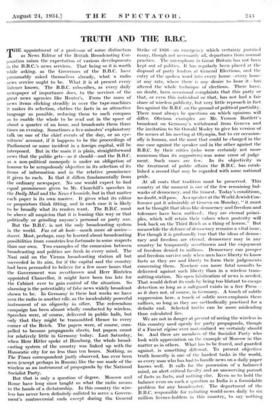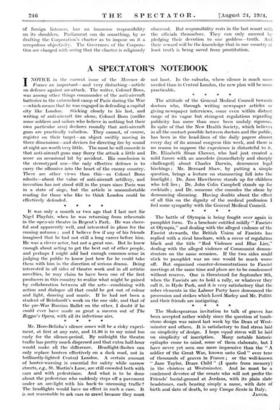TRUTH AND THE B.B.C.
THE appointment of a professor of some distinction as News .Editor of the British Broadcasting Cor- poration raises the expectation of various developments in the B.B.C.'s news services. That being so it is worth while asking, as the Governors of the B.B.C. have presumably asked themselves already, what a radio news service ought to be. What it is at present every listener knows. The B.B.C. subscribes, as every daily newspaper of importance does, to the services of the great news agencies like Reuter's. From the mass of news items clicking steadily in over the tape-machines it makes its selection, clothes the facts in as attractive language as possible, reducing them to such compass as to enable the whole to be read out in the space of about a quarter of an hour, and broadcasts them three times an evening. Sometimes a five-minutes' explanatory talk on one of the chief events of the day, or an eye- witness' account, if it happens to be the proceedings of Parliament or some incident in a foreign capital, will be interposed. But in the main it is plain, straightforward news that the public gets—as it should—and the B.B.C. as a non-political monopoly is under an obligation of honour to be scrupulously objective in its selection of its items of information and in the relative prominence it gives to each. In that it differs fundamentally from the ordinary newspaper. No one would expect to find equal prominence given to Mr. Churchill's speeches in the Daily Mail and the News Chronicle, but in that matter each paper is its own master. It gives what its editor or proprietors think fitting, and in each case it is likely to be broadly what its readers want. The B.B.C. must be above all suspicion that it is leaning this way or that politically or grinding anyone's personal or party axe.
But the B.B.C. is not the only broadcasting system in the world. Fas est ab hoste—much more ab doceri. Most, perhaps, may be learned about broadcasting possibilities from countries less fortunate in some respects than our own. Two examples of the connexion between broadcasting and politics are fresh in every mind. The Nazi raid on the Vienna broadcasting station all but succeeded in its aim, for if the capital and the country had been persuaded to believe for a few more hours that the Government was overthrown and Herr Rintelen appointed Chancellor, it might have been too late for the Cabinet ever to gain control of the situation. So alarming is the potentiality of false news widely broadcast shown to be. In Germany in these last weeks we have seen the radio in another role, as the incalculably powerful instrument of an oligarchy in office. The referendum campaign has been almost wholly conducted by wireless. Speeches were, of course, delivered in public halls, but only that they might be transmitted thence to every corner of the Reich. The papers were, of course, com- pelled to become propaganda sheets, but papers count for relatively little in Germany today. Last Saturday, when Herr Hitler spoke at Hamburg, the whole broad- casting system of the country was linked up with the Hanseatic city for no less than ten hours. Nothing, as The Times correspondent justly observed, has ever been seen (except perhaps in Russia) like the use made of the wireless as an instrument of propaganda by the National Socialist Party.
But that is only a question of degree. Moscow and Rome have long since taught us what the radio means in the hands of a dictatorship. In this country the wire- less has never been definitely enlisted to serve a Govern- ment's controversial ends except during the General Strike of 1926—an emergency which certainly justified many, though not necessarily all, departures from normal practice. The microphone in Great Britain has not been kept out of politics. It has regularly been placed at the disposal of party leaders at General Elections, and the entry of the spoken word into every home—every horne at any rate, where there is any desire to hear it—has altered the whole technique of elections. There have. no doubt, been occasional complaints that this party or that, or even this individual or that, has not had a fair share of wireless publicity, but very little reproach in fact lies against the B.B.C. on the ground of political partiality. There must always be questions on which opinions will differ. Obvious examples are Mr. Vernon Bartlett's broadcast on Germany's withdrawal from Geneva and the invitation to Sir Oswald Mosley to give his version of the scenes at his meeting at Olympia, but to err occasion- ally is human, and the most that could be charged in the one case against the speaker and in the other against the B.B.C. by their critics (who were certainly not more numerous than its supporters) was some error of judge ment. Such cases are few. In its objectivity in the treatment of public affairs the B.B.C. has estab- lished a record that may be regarded with some national pride.
At all costs that tradition must be preserved. This country at the moment is one of the few remaining bul- warks of democracy, and the firmest. Today's conditions, no doubt, will pass. As a speaker at the World Jewish Con- ference put it admirably at Geneva on Monday, " it must not be thought that ideas like democracy and freedom and tolerance have been outlived ; they are eternal princi- ples, which will retain their values when posterity will look back on the Third Reich as a thing of horror." But meanwhile the defence of democracy remains a vital issue. For though it is profoundly true that the ideas of democ- racy and freedom are eternal, democracy may in any country be temporarily overthrown and the enjoyment of freedom denied to millions. Democracy can prosper and freedom survive only when men have liberty to know facts as they are and liberty to form their judgements concerning them. Nowhere can more fatal assaults be delivered against such liberty than in a wireless trans- mitting-station. No open falsification of news is needed. That would defeat its ends by being too blatant to escape detection so long as a safeguard exists in a free Press-- as it does not, of course, in Germany. A touch of subtle suppression here, a touch of subtle over-emphasis there suffices, so long as they are methodically practised for a definite end. Selected truths can be more misleading than calculated lies.
We are not in danger at present of seeing the wireless in this country used openly for party propaganda, though if a Fascist regime ever materialized we certainly should be. And there are members of the Socialist Party who look with appreciation on the example of Moscow in this matter as in others. What has to be feared, and guarded against, is something different. To present objective truth honestly is one of the hardest tasks in the world, as every man who has had to handle news on a daily paper knows well. It calls for the possession of a balanced mind, an alert critical faculty and an unswerving pursuit of facts as facts, and nothing else. Even so to hold the balance even on such a question as India is a formidable problem for any broadcaster. The department of the B.B.C. responsible for radiating world-news daily to six million licence-holders in this country, to say 'nothing of foreign listeners, has an immense responsibility on its shoulders. Parliament can do something, by so drafting the Corporation's charter as to impose on it a scrupulous objectivity. The Governors of the Corpora- tion are charged with seeing that the charter is religiously observed. But responsibility rests in the last resort with the- officials themselves. They can only succeed by pledging their devotion to one goddess—truth. And their reward will be the knowledge that in one country at least truth is being saved from prostitution.



































 Previous page
Previous page